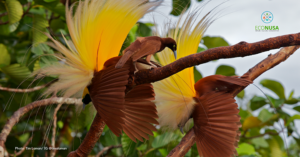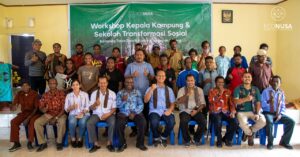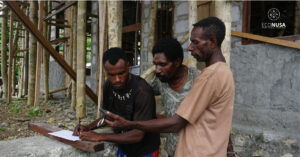
Environmental education for young people is crucial. Because the youth is a figure who will take policy in the future. Without a good understanding of the environment, the sustainability of forests and the certainty of a proper environment in accordance with the constitutional mandate is impossible to achieve.
“Investment in young people is important because in the next 10 to 15 years they will be the people who protect our forests,” said Chairman of the EcoNusa Indonesia Foundation, Bustar Maitar in launching the School of Eco Diplomacy program, in the Arboretum Park, Manggala Wanabakti Building, Jakarta, Tuesday (4/9).
Also present at the launch was Head of the Counseling and Human Resources Development Agency (BP2SDM) Ministry of Environment and Forestry Helmi Basalamah and Lecturer at the Faculty of Forestry, University of Papua (Unipa) Jimmy Wanma. In Eco Diplomacy, 30 selected youths from all over Indonesia will take part in a series of activities to raise critical awareness about forest and environmental issues and create young cadres who have community values.
In this program, 70 percent of participants come from Eastern Indonesia. Bustar explained the current condition of forests in Papua, which is the last frontier of tropical rain forests in Indonesia, needs special attention.
“If we can’t manage it properly, our forests will be depleted. This forest in Papua does not only belong to Papua, but also to Indonesia,” he said.
At present, based on data from the Ministry of Environment and Forestry, the latest forest data collection in Papua and West Papua in 2010 said that forests in Papua reached 40.5 million hectares. That number will continue to be reduced by deforestation and the activity of converting forests into industrial and plantation estates.
Therefore, the first batch of graduates of Eco Diplomacy is expected to be able to make a real contribution especially to the forests of Papua. That was said by Jimmy Wanma.
As an academic, he said that the lack of further research on the Low Land forest area in West Papua would be very detrimental to the region.
“Because the majority of the area has been projected for development, so now it is a joint task for us to protect and be able to do something there,” he said on the same occasion.
Therefore, with Eco Dilomacy, he hopes that the impact will be felt by the people of Manokwari, West Papua. “They will live with the community, of course it will be a good capital to feel our lives there,” explained Jimmy.
Meanwhile, the Ministry of environment and forestry expressed their full support for the program launched in their office area.
“In the past 20 to 30 years we have seen how this concern for the environment grows. Many emerging communities, movements, activists and environmental observers. This is a form of diplomacy in a new form, people to people context, the efforts of the EcoNusa Foundation in the form of the School of Eco Diplomacy should be appreciated because this is a form of direct effort from the community for the sustainability of the Environment and Forestry,” Helmi said.
He mentioned that all forms of activities carried out in the School of Eco Diplomacy could be a way to produce local champions in forestry and environmental issues. The hope, local champions can become international sounding on the issue.







